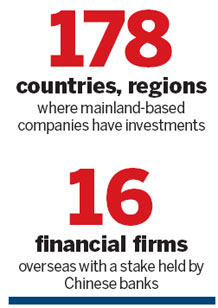Chinese bankers forming global network
Updated: 2011-12-09 08:09
By Zhang Zhao (China Daily)
|
|||||||||||
One way to better understand the changes that have taken place in China as a result of its joining the World Trade Organization in 2001 is to take a look at its banking industry over the past decade.
The amount of annual outward investment abroad has been growing at an average rate of almost 50 percent, since 2003, and reached $68.8 billion worth in 2010, putting China in fifth place globally.
Mainland-based companies had $317.2 billion worth of investments in 178 countries and regions by the end of 2010.
And, as more Chinese companies go abroad, so are Chinese banks taking a closer look at international markets, and forming a global network.

Chinese banks had nearly 100 branches around the world by the end of June of this year, and had completely purchased or had shares in 16 financial organizations abroad.
Bank of China (BOC), one of China's leading banks with the widest international reach, and greatest amount of experience, was recently listed as one of the world's 29 most important financial organizations.
BOC's business covered 34 countries and regions by the end of 2010 and it had nearly 1,000 offices overseas, and assets worth 2.3 trillion yuan ($361.3 billion).
In 2009, when a Chinese company acquired the mines of an Australian lead-zinc mining company, at a cost of $1.2 billion, there were hidden risks because of unpaid debts.
But BOC was on hand to provide financial assistance. It dropped its original response to put together a bundle of financing with other banks, and decided to handle the deal by itself.
The service it provided was a "firewall" that contained the risks and provided the security that the company needed.
BOC has said that it believes that Chinese companies grow in the global market is one way to improve its international services.
And, by designing various financial products, it has been able to help Chinese companies deal with international policies and regulations as well as foreign exchange.








